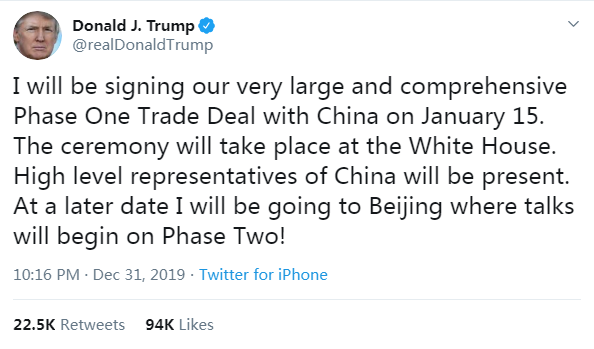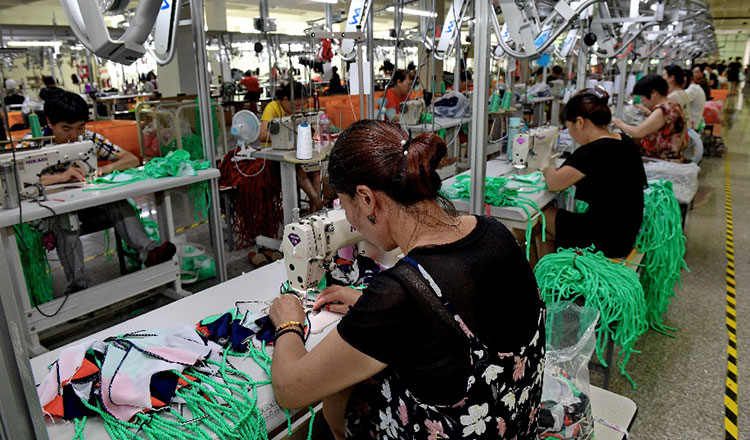Editor's note: Tom Fowdy graduated from Oxford University's China Studies Program and majored in politics at Durham University. He writes about international relations focusing on China and the Democratic People's Republic of Korea. The article reflects the author's opinions, and not necessarily the views of CGTN.
As 2020 commenced, U.S. President Donald Trump announced that the China-U.S. trade deal will be signed on January 15 at the White House. In addition, Trump also declared he would in the near future be visiting Beijing, where he would immediately seek to open negotiations for a "phase two" trade agreement to build on the first. The move comes as the president prepares for an election this year, eager to shore up his record in the face of challenges from Congress and a pending impeachment trial.

The rhetoric is certainly what we want to hear, but will it hold up in substance? All evidence illustrates now that Trump's desire to reach a deal in the view of his re-election prospects is serious and the political and economic stakes for him count deeply, even if the specific terms and issues are not yet clear. There is no doubt that further negotiations can nevertheless quell some of the anti-China hysteria abounding in Washington and induce greater stability in the bilateral relationship. While some things will not go away, nevertheless learning to live and co-exist with one another is crucial.
When a presidential election year rolls into town in America and a sitting president is pushing for a second term, all of his focus, resources and priorities become geared towards achieving re-election. This makes daily politics in the White House extremely sensitive, not least under Donald Trump.
There are several pressing issues likely to be at the forefront of his mind. First: Impeachment. House of Representatives leader Nancy Pelosi is well aware the effort cannot successfully remove Trump from office. However, she is determined nevertheless to drag out the process to magnify the political burn on the president, much to his disdain. Trump will not lose, but he will be bruised.
Second of all: the economy matters to him. The only thing which has served as a restraint between Trump and more extreme China hawks in Washington is the fact that he cares about business and the U.S. economy. Trump endlessly proclaims he has achieved "the best economy ever" and champions the stock market as a signal of economic confidence, but in reality the country's growth has been slowing down, exacerbated by his own trade war. This factor has been a key motivator behind the president's bid to seek out a "phase one" trade deal and also cancel pending tariffs.
On both counts, the president is consequentially declaring his goal to push for a "phase two" agreement with Beijing in the aim of securing a political and economic victory to champion as part of his re-election campaign; he needs to be able to prove to the electorate that his trade war effort was beneficial and not damaging to America. In these negotiations, Trump will inevitably be looking to secure more gains for American industry and more market confidence.

Workers sew swimsuits at a factory of the Qicaihu Garments & Weaving Co. Ltd. in Jinjiang, southeast China's Fujian Province, August. 14, 2019. /Xinhua Photo
Workers sew swimsuits at a factory of the Qicaihu Garments & Weaving Co. Ltd. in Jinjiang, southeast China's Fujian Province, August. 14, 2019. /Xinhua Photo
Consequentially, it's likely that U.S. demands from this will center on matters such as "industrial subsidies" to Chinese companies, intellectual property guarantees and other structural issues.
Not surprisingly, this might make negotiations sticky. Some experts have been pessimistic as to just how far things can feasibly move forward given the gaps between the two sides.
As far as China is concerned, first of all, Chinese President Xi Jinping has set the tone that China will continue its priority of economic development, reform and opening-up in 2020; it is not looking for contention with the United States. China's own interest is rooted in ending the trade war. On this note, secondly, Beijing observes that stabilizing the relationship with Washington is important.
A "phase two" trade deal may be an opportunity to counter some of the anti-China hysteria dominant in Washington. While clearly many aspects of renewed contention are not going to change, nevertheless it is absolutely crucial to establish a newly found stability in the relationship that aims at non-disruptive co-existence.
In doing so, these negotiations provide a window to relegate the most extreme anti-China hawks back to the fringes and uphold Trump's interest in keeping more aggressive moves off the agenda. Thus, as a whole, while the details remain scant and yet to come, Trump's new year declaration to seek a "phase two" trade deal is positive and a step in the right direction. Re-election matters for the president, and therefore he's going to take the economy even more seriously than before.
(If you want to contribute and have specific expertise, please contact us at opinions@cgtn.com.)